If you plan to start a business, it’s essential to create a strong online presence. The same goes for a blog. And the best way of getting a lot of traffic and attention to your site is through a solid SEO strategy.
Keyword research is an integral part of the SEO plan of a website. Doing it right will set you up for success and doing it wrong will leave you frustrated. The good news is that it’s very simple to understand.
In this guide, we’ll cover what keyword research is and how you can do it the right way. We’ve created this post such that even a beginner can understand all about it. So, let’s dive in!
What Is Keyword Research?
Understanding keyword research is easy. Let’s break down the two words – Keyword and Research. A keyword is simply what a person types into a search engine. They’re also often called search queries.
For example, if you’re looking to buy an android phone under $1,000, you’d probably type something into the search engine like “Android Phones Under $1000”. Here the search term- “Android Phones Under $1000” will be the keyword.

Now, let’s look at the next part – research. If you’re a business or a blog, there must be some relevant keywords that you want to be found for.
You’d have to consider several things when choosing the final keywords you want to go after. These metrics include monthly search volume, competition, relevance, search intent, and much more.
After you complete the research, the idea is to end up with a list of keywords for which you want to rank on the first page of Google. The next step is to rank in the search engine for those search terms.
Note: When we talk about search engines, we’re mostly talking about Google. It has a 91.88% market share as of 2024. So, giving the effort to get your website indexed and ranked in Google makes more sense than going for the other ones like Bing and Yahoo.
Why Is Keyword Research Important?
All search engines have the same job – to show users the most relevant content. When someone asks a query, it tries to find the most useful content it can show the visitor.
Keyword research is important because it gives you a perfect idea of which search queries you want to target and rank for. It’s the most essential part of any website’s SEO strategy.
If you’re still wondering why keyword research is so important, here are the main reasons behind it:
Giving Audiences What They Desire
When you do keyword research, you’ll find out what your visitors are actually searching for. You’ll get to know about the common queries your target customers will have.
The next step would be to write an informative blog post that answers the questions of your customers. You have to do it in a way that you can beat your competitors. Keyword research is great for finding these topics that your customers are already interested in.
Imagine if you write a great blog post and publish it on your website. You even managed to get backlinks from high-domain authority sites. But turns out you don’t get any visitors.
That’s because you can’t just write about whatever you want. Especially, if you’re starting out and nobody knows who you are. First, you’d have to answer queries that people have. It’ll lead to more traffic to your website and more customers for your business.
Setting Your Expectations
Though most keyword research tools are way off, you’ll have an idea of the search volume and the ranking difficulty of the keywords you’re targeting when doing your research. As a general rule, low search volume keywords have much lesser competition.
They tend to rank more easily and quickly. But if you’re going after high-volume search keywords, you know that you’ll have to put a lot more effort and build backlinks for such terms.
You can also get a good idea of the competition and see what they’re ranking for. You can know all these things ahead of time before you start any work. All thanks to keyword research.
Finding New Topics
Still wondering – why do keyword research? While doing it, you’ll find a plethora of topics that won’t come to your mind on your own. And that’s one of the biggest benefits of keyword research.
Whenever you’re stuck and having difficulty finding new ideas for your blog, keyword research can be your savior. You may also find opportunities with low competition if you know how to do it well.
What Are The Types Of Keywords?
Based on the length of keywords, we can divide them into three categories:
Short Tail Keywords
As the name suggests, short-tail keywords are search queries that are short. They’re usually either one or two words. For example, “cat food” is a short tail keyword.
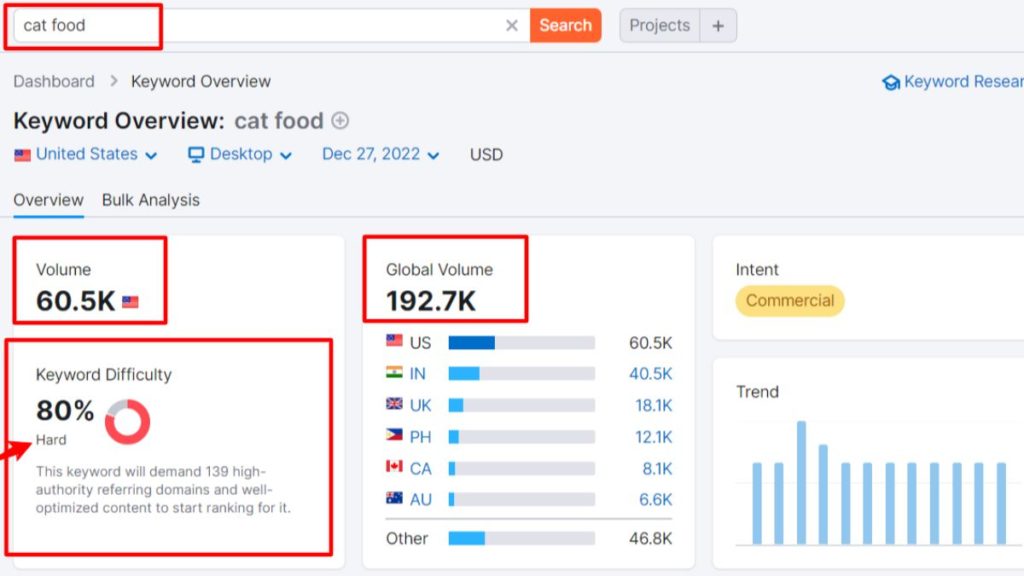
Generally speaking, short-tail keywords have a lot of competition and are very difficult to rank for. It’s not a good idea to go after them unless you’re a big player in your niche.
Mid Tail Keywords
The mid-tail keywords sit between the short-tail and long-tail keywords. They’re usually three to four words in length. For example, “freeze dried cat food” is a mid-tail keyword.
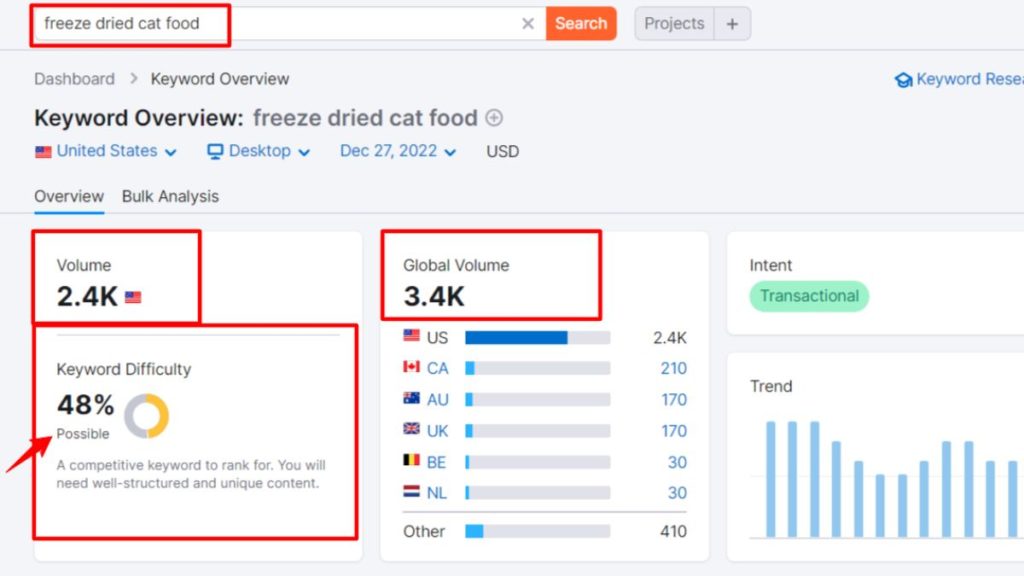
The general rule of thumb is that it’ll have less search volume than the short-tail keywords. Thankfully, the competition will also be less and they’ll be comparatively easier to rank for.
Long Tail Keywords
The search queries that are more than five words are long tail keywords.For example, “best cat food for gassy cats” is a long-tail keyword.
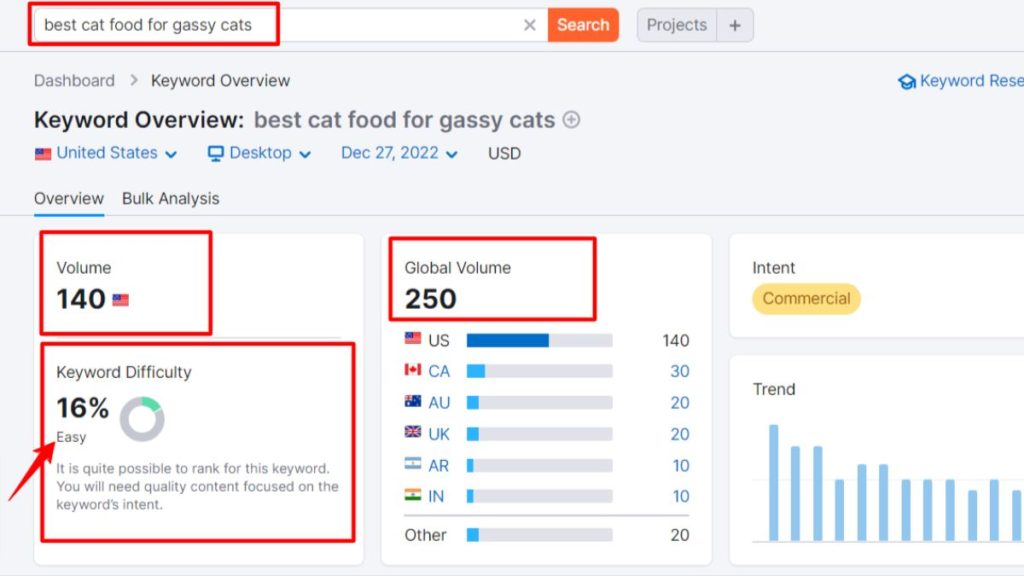
These keywords will have a much lesser search volume than the previous two types. But, the traffic from such keywords is often more qualified as they answer a specific question in most cases. They’re also easier to rank for as they have less competition.
Though these types of keywords have a low search volume, it’s much easier to rank for them if you publish great content and follow the On-page SEO principles thoroughly.
You’ll rank quickly for these search terms without even building backlinks in most cases if you publish better content than your competitors.
These are the ideal keywords for you to target if you’ve launched a new website and you have low domain authority. Eventually, you’ll need to get backlinks from high-authority sites if you want to stay at the top of the rankings.
Those were the types of keywords based on their length. But an important thing to consider for any marketer or SEO expert is the search intent behind the keywords.
Here are the four most common types of keywords based on the search intent of the users:
Navigational Keywords
These are the keywords that someone types into the search engine to get to a physical or digital location. Here are some examples of navigational keywords:
- Coffee shops near me.
- Keyword research agency near me.
- Diginova Blog.
- Youtube.
Informational Keywords
The keywords that users type into a search engine to find information about a specific topic or business are informational keywords. You can establish yourself as an authority figure in your niche by creating content around these keywords.
Some examples of informational keywords are:
- How to do keyword research?
- Benefits of keyword research.
- What to feed your cat?
- What is on-page SEO?
Commercial Keywords
These are the types of keywords of customers when they’re doing the research before making a purchase. The goal of the user is to find more information before making a final decision.
Here are some examples of commercial keywords:
- Best android phones under $500.
- iPhone 14 review.
Transactional Keywords
The keywords that customers enter into a search engine when they’re ready to make a purchase are called transactional keywords. Customers are looking for a specific product or service here.
Some examples of transactional keywords are
- Cars for sale.
- Buy cycle online.
- Best food for the cat
Those were the keywords based on length and search intent. Besides them, here are the other types of keywords you should know about:
LSI Keywords
LSI or Latent Semantic Indexing keywords are used by the search engine to find context to the main keyword. In other words, it’s a fancy name for related keywords.
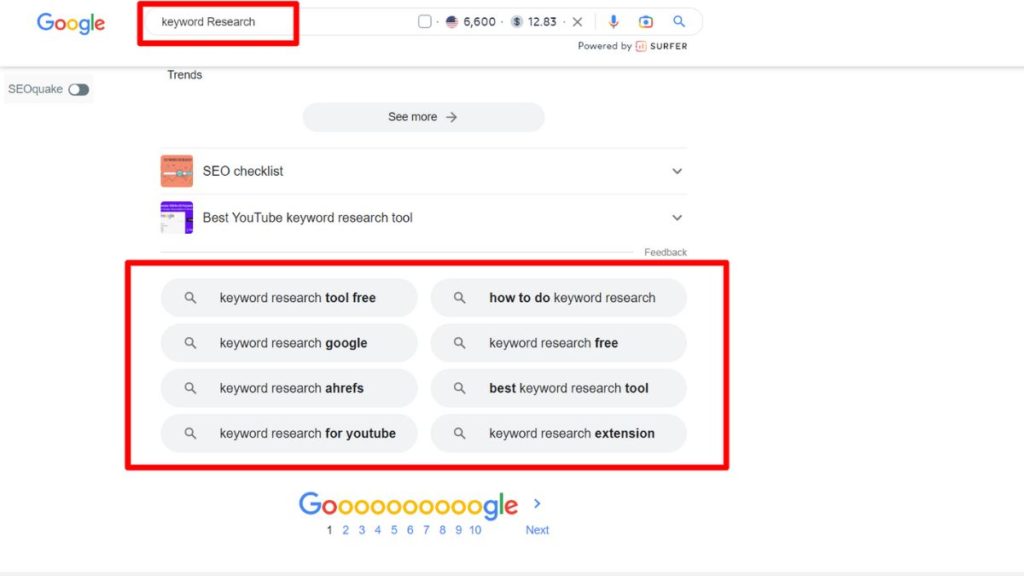
These are the keywords that appear at the bottom when you search for something on Google. These keywords are shown as they’re also searched by the visitors.
When you click on any of the related keywords at the bottom, you’ll also see the related keywords for that keyword. Some of these keywords can be incredible opportunities to bring in a lot of traffic.
When you use a tool, you’ll see additional metrics like search volume and KD. But they’re not as fast as Google is adding more related keywords of LSIs. That’s why it’s best to search for these keywords manually.
Besides the keywords that appear at the bottom of the SERPs, you can find more LSI keywords by following the Google Autosuggest method.
Type the main keyword into Google and it’ll automatically show you more ideas of what people are searching for. Both these options are great for finding the right LSI keywords.
Let’s look at it with an example. If there’s a blog post about “Apple” and there are keywords like fruit, juice, recipe, and so on, Google will know that you’re talking about the fruit. But if there are words like Itunes, charger, and phone, it’ll know you’re talking about the company.
When publishing an article on your website, it’s important to sprinkle the LSI keywords that naturally go with the content. So, how can you find them?
Using google autosuggest is a great way to find some LSI keywords. Or, you can also use a tool called LSIgraph to generate a list of relevant LSI keywords for your content.
What Are Keyword Research Metrics?
Before diving deep into how you can find keyword ideas and finalize the ones you want to target, you should understand some key metrics. They’ll help you a lot in deciding which keywords are worth going after.
Here are the most important keyword research metrics
Search Volume
There’s no point in targeting keywords if nobody searches for them. The search volume represents the number of searches a keyword gets per month. It’s an average of the last 12 months of data.
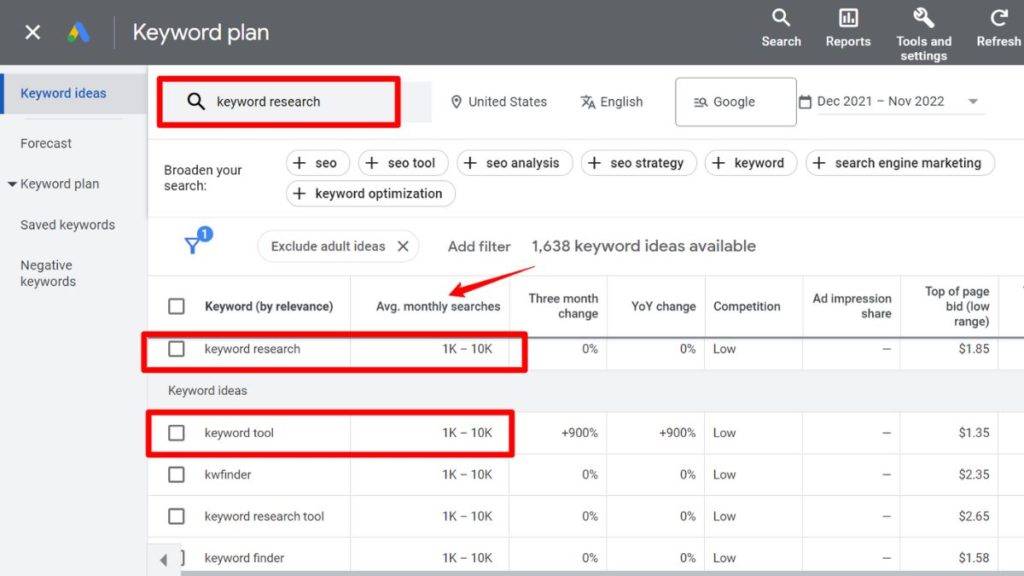
You may see varying results in the search volume on different tools. That’s because only Google has accurate data on search volume. The picture you see above is generated by using Google Keyword Planner.
It’s accurate but the problem is that it shows a big range of search volume between 1-10K. The other tools only try taking a close guess using their algorithms.
Regardless of which method you use for doing keyword research, you want to find keywords that have a high search volume. Unless the next factor ruins your chances of ranking for it.
Competition
It would be awesome if you could find keywords with high search volumes and instantly rank for them. But unfortunately, it’s not that easy. If a keyword has a high search volume, your competitors are probably already ranking for it.
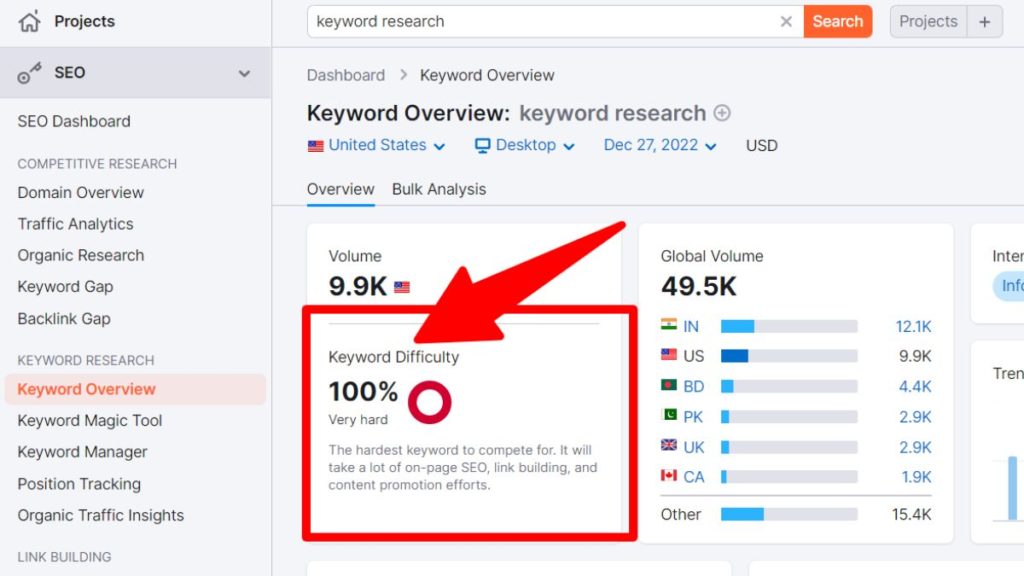
You can easily find how difficult it would be to rank for a keyword in any keyword research tool. You’ll often get a score that’s either called KD (Keyword Difficulty) or SD (SEO Difficulty) based on the tool you use.
This score can be anywhere from 0 to 100. The higher the score, the more difficult it would be to rank for that keyword.
The KD or SD score is generally given considering the DA, PA, and number of backlinks of the web pages ranking on the first page. It’s not that you can’t still outrank them. But you’ll have to spend a lot of time posting high-quality content and building links.
That’s just not viable if you’re only starting out. So, you can’t just blindly target keywords with high search volume. You’ll have to consider the competition as well.
It’s a good idea to target mid-tail and long-tail keywords first that have low KD scores. Once you start ranking for them and build your domain authority, you can go after the keywords with more competition.
CPC (Cost Per Click)
Though CPC is more relevant for marketers who want to run ad campaigns, it can be used for organic keyword research as well. A high CPC indicates that there’s a lot of demand for that keyword.
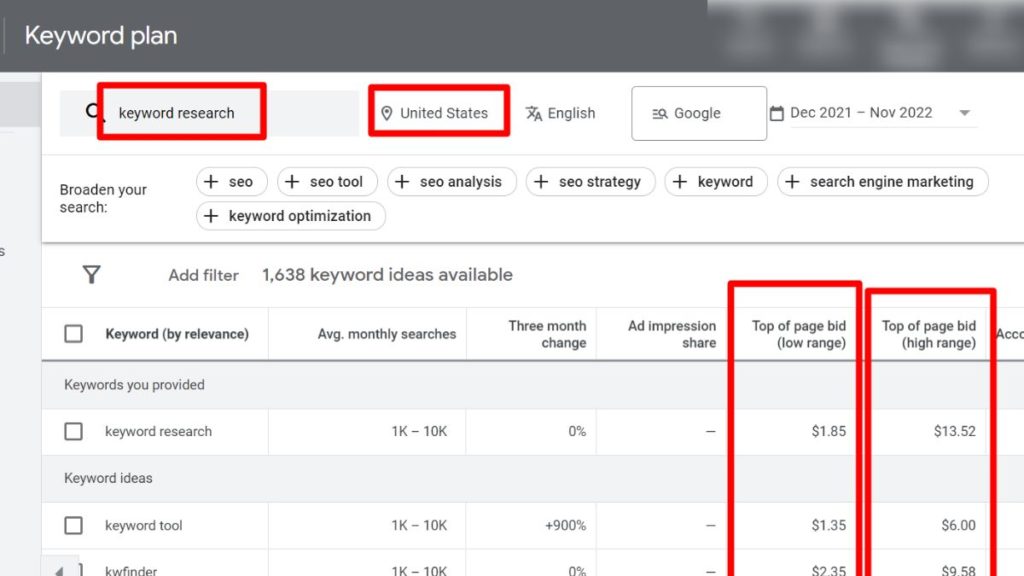
So, it’s a good idea to try ranking for such keywords if there isn’t too much competition. Even if you plan to run ads, keep in mind that Google will still show the most relevant content at the top.
You can win higher rankings even in paid ads if you publish higher quality content than your competitors. So, keyword research is a big deal even if you’re running advertisements.
How to do keyword research for PPC? The same principles apply to organic keyword research. The only difference is that you’ll be selling a service or product in most cases and trying to generate the maximum revenue.
Traffic Potential
Not all keywords will result in a user clicking on your website. For example, a lot of people are looking for Elon Musk’s age. But they can find the information on the SERP itself.
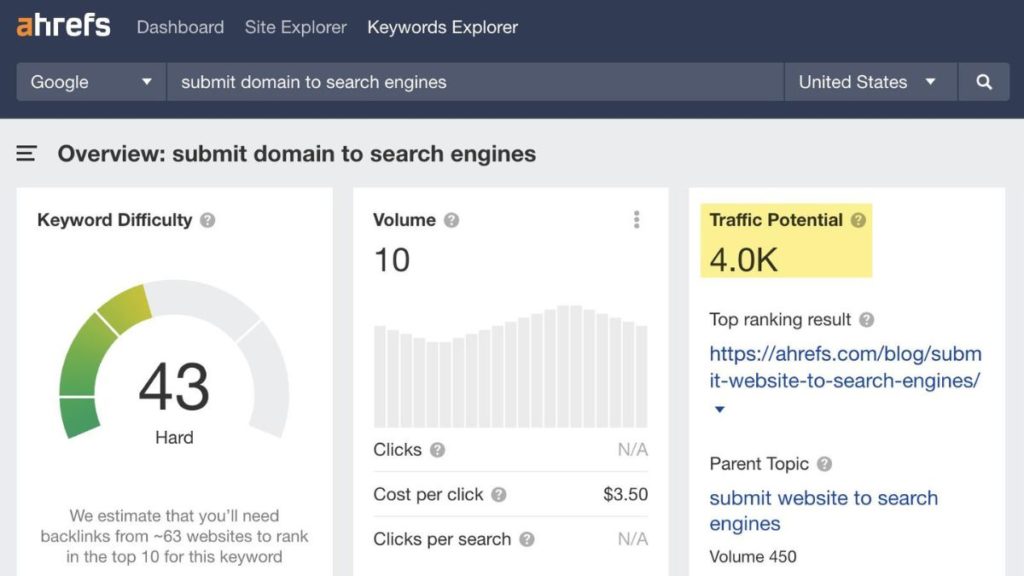
They don’t have to click anywhere. So, such keywords aren’t worth targeting. Ahrefs is a great tool you can use to get an estimate of the traffic potential when you rank for a keyword.
Keyword Trends
The search volume of a keyword shows the average searches per month based on the last 12 months. But what if you target a keyword that’s only searched during a specific time?
For example, searches related to golf spike during the summer and decline during the other months. You can use Google trends to check the demand for a keyword over time.
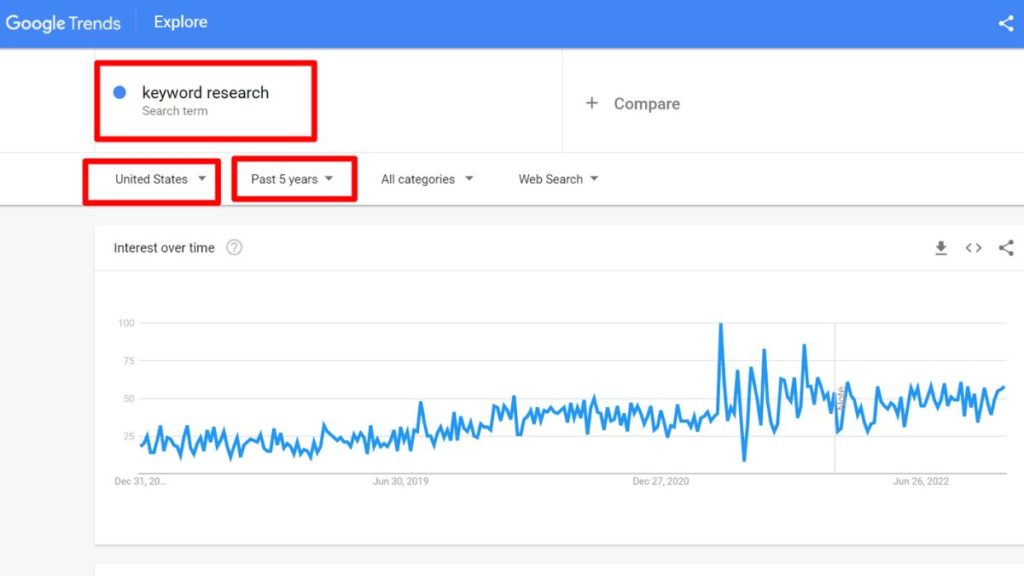
You can find a score between 0-100 for a specific keyword over a long period. It also gives you the option of comparing many topics together. After checking google trends, you’ll have a clear idea if the keyword you’re going after is seasonal or evergreen.
How To Find Keyword Ideas?
There are numerous ways of finding new keywords. You can do it using your common sense and some free and paid tools. Here they are:
Your Niche
If you select your niche, you’ll already know some of the common topics around it. These topics will be your guiding start to finding more relevant keywords.
For example, if you’re writing a blog about weight loss, you can divide it into further topics like – exercise routine, diet plan, and so on. Make a list of 5-6 topic buckets.
Free Tools
Now that you have the seed keywords ready, you can use these free tools to get more keyword ideas:
Google Keyword Planner
This a free tool by Google. You can type your seed keywords into Google Keyword Planner and get a list of more keywords. The data will be accurate since it’s provided by Google itself.
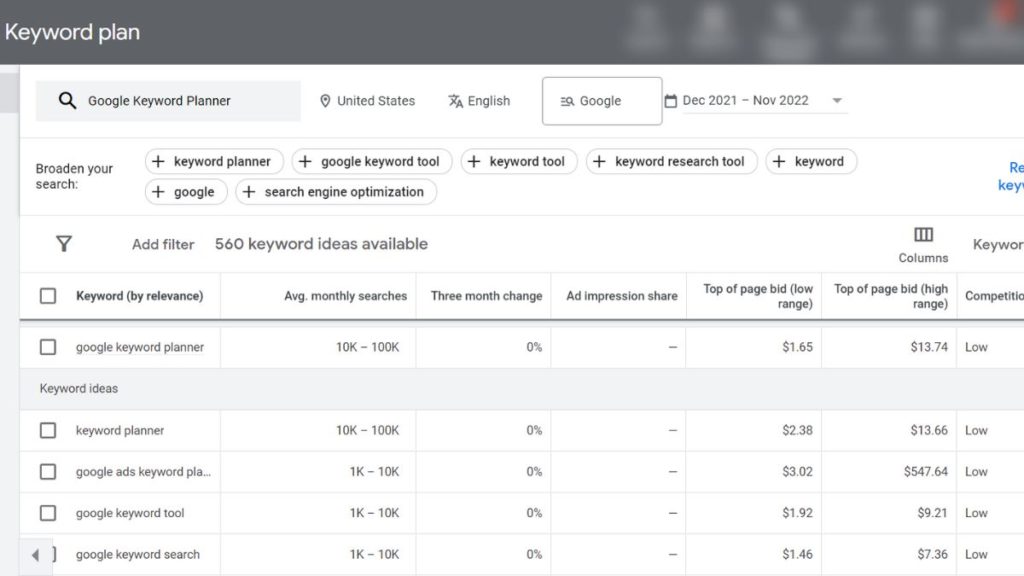
The issue with GKP is that it’ll show you only a range of search volume for some keywords. For example, it can show the search volume to be from 1-10k. That’s a pretty wide gap.
Google AutoSuggest
The best way to generate keywords is using google autosuggest. Type the search query into Google and it’ll autofill the data for you. How long does keyword research take following this method?
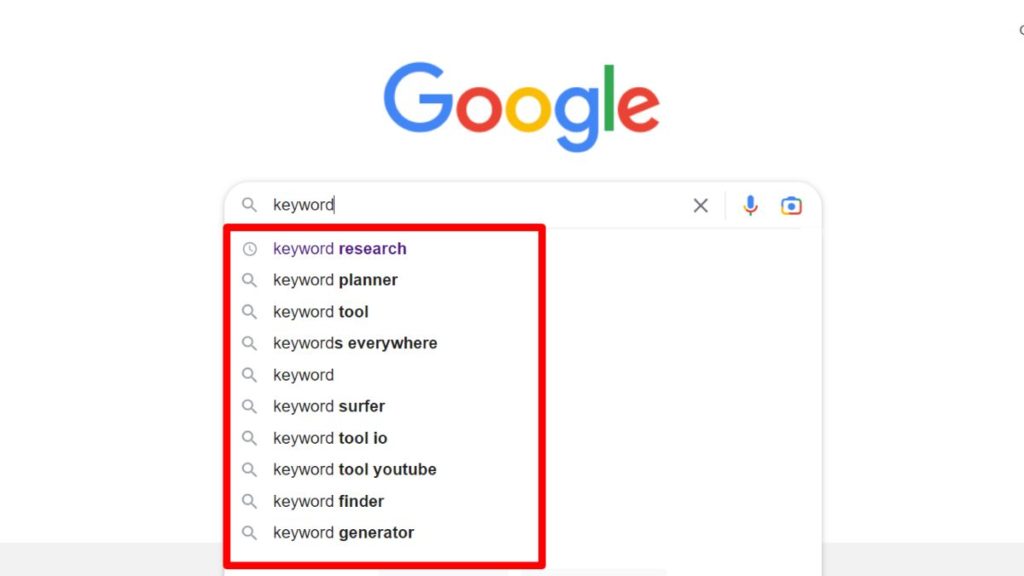
As you may have guessed, it’ll take the longest time to research keywords this way. But it’ll give you the most accurate information. Look at the example above to understand how Google autosuggest works.
Answer The Public
Wondering how to do keyword research for the blog? The best tool for it is Answer The Public. When you type your keyword, it’ll give you a bunch of questions that people are asking about that topic.
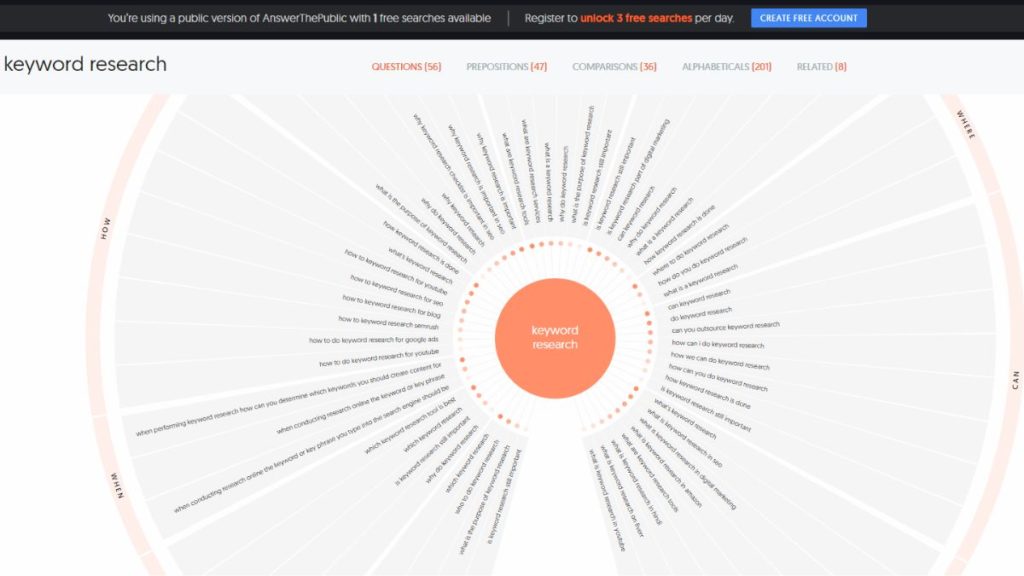
Forum
You can also get keyword ideas by looking at what people are discussing in the forums. Type “your topic+forum” into google and join some forums to generate more ideas.
Reddit is a popular site where you can find a lot of user-generated content on any topic. Complete your Reddit keyword research by searching for your niche and making a list of topics that people are discussing.
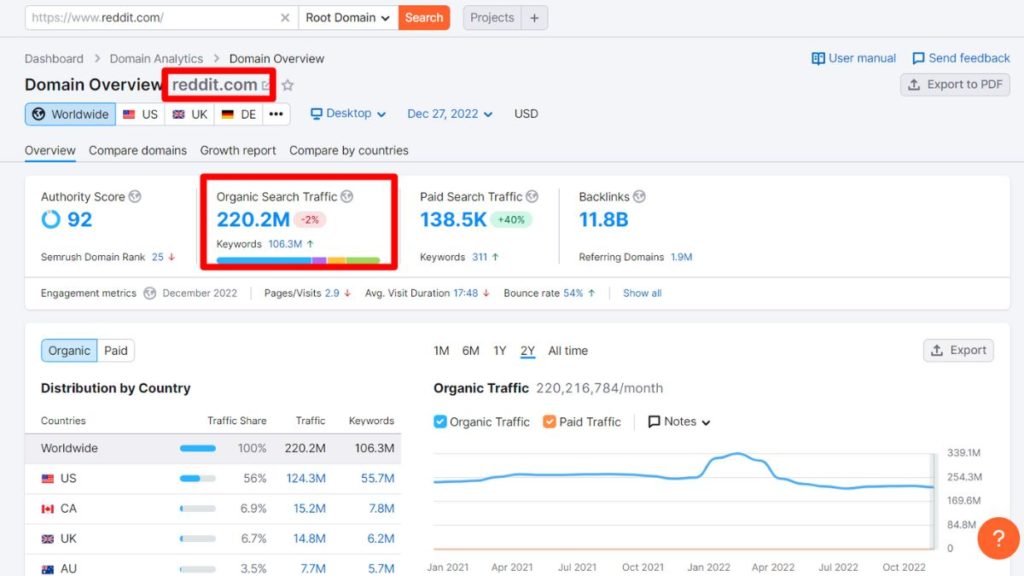
Google Search Console
You can find the keywords you’re ranking for with Google Search Console. It’ll also show you a bunch of other important metrics like monthly traffic, average session duration, bounce rate, and so on with accuracy.
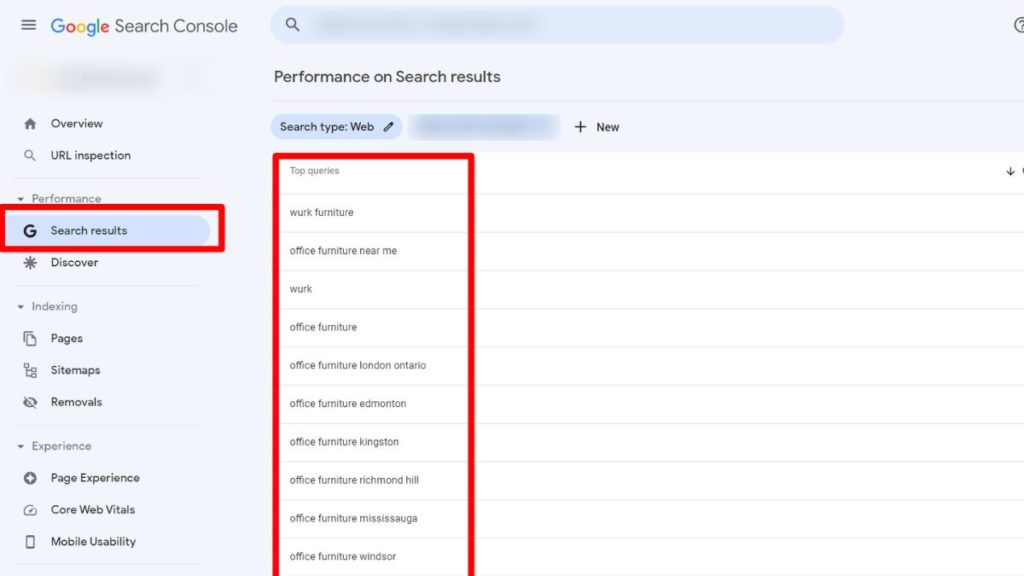
Google Trends
You already know how to use Google Trends. It won’t help you generate new ideas. But, using this tool is a must to get an idea of the overall demand for your keyword.
Social Media
Social media is great for keyword research and finding new ideas. Search about your topic on different platforms like Facebook, Twitter, Linkedin, Pinterest, LinkedIn, and Quora to find out more ideas about them.
Paid Tools
Wondering what are the best keyword research tools? If you’re okay with spending some money, here are the industry-leading tools for Keyword research:
Ahrefs
Ahrefs is arguably the best-paid tool for keyword research. It’s said to be the most accurate and it also shows more ideas than the other ones. There’s also a free version you can use to get some keyword ideas.
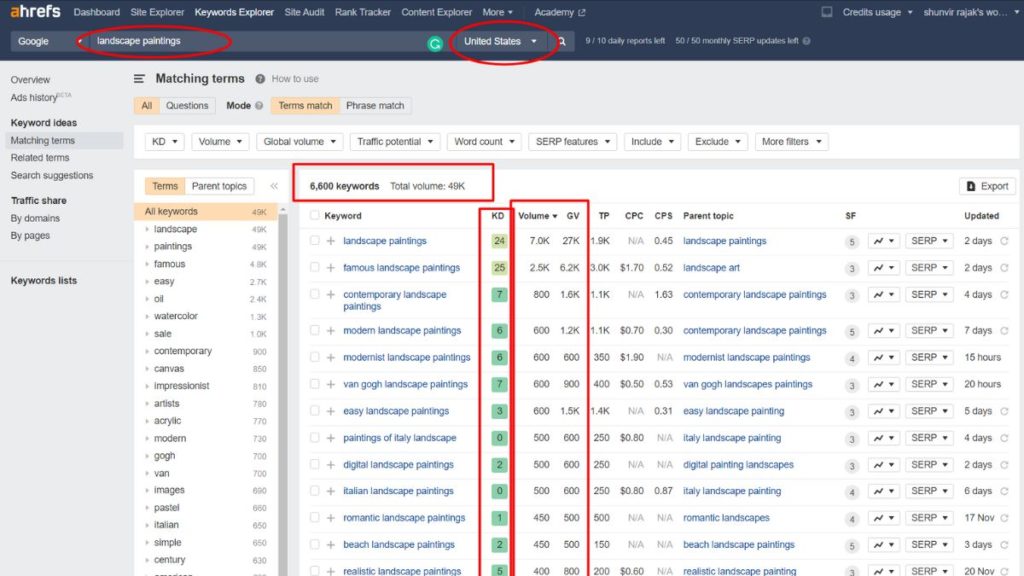
How to use Ahrefs for keyword research? Just type the seed keywords and it’ll give you a long list of relevant keywords. It’ll come with metrics like volume, KD, CPC, Traffic Potential, and so on.
You can do both local and international keyword research using it. It allows you to see the metrics for different locations. That’s why it’s an effective keyword research tool.
SEMRush
In our opinion, SEMRush is the second-best-paid tool in the market. How to do keyword research using SEMrush? It works just like Ahrefs. You type in the keyword and it’ll generate a lot of keywords for you.
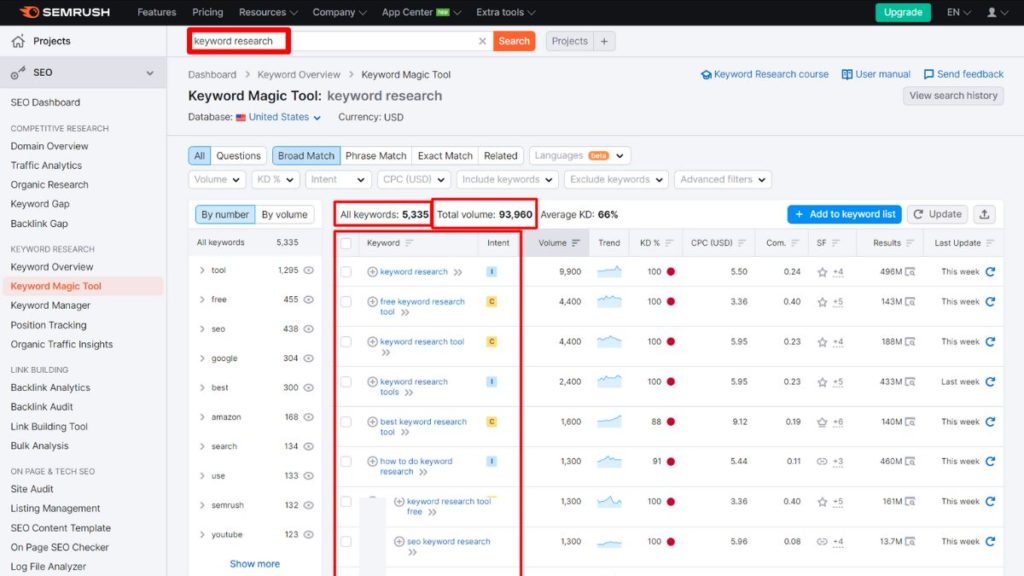
Ubersuggest
Neil Patel is a popular figure in the digital marketing space and he created Ubersuggest. It’s an effective keyword research tool that works the same way as Ahrefs and SEMRush.
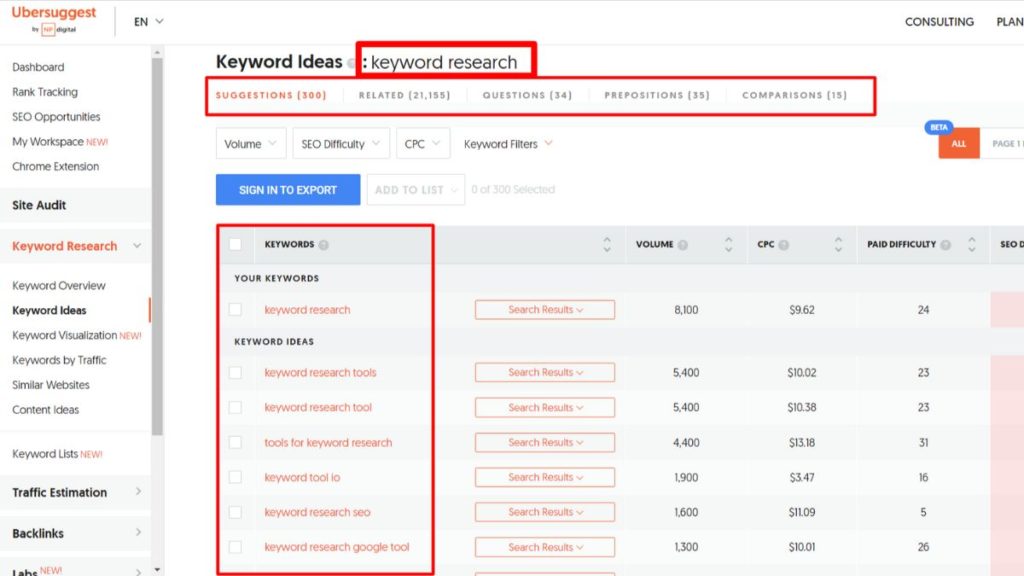
You can get 3 keyword searches every day for free on Ubersuggest. It’s also one of the best chrome extensions for keyword research. You can install it and get results while you’re browsing the internet.
How To Do Keyword Research 2024?
The aim of keyword research is to find a list of relevant keywords for which you want to rank on the first page of Google. Here’s a step-by-step guide on how you can do keyword research:
Step 1: Identify The Seed Keywords
You should already have an idea about the topics related to your business. The idea in this step is to find some topic buckets that are most relevant to your business. There’s no need to be precise in this step.
Step 2: Generate Keyword Lists
By now, you already know how to find keyword ideas. Use the methods discussed above and generate a list of relevant keywords using free and paid tools.
Step 3: Analyze & Filter The Keywords
In this step, you’ll have to analyze the competition and search volume of the keywords. Make a keyword research checklist based on your preferences and exclude the keywords that don’t seem worth the effort. Keep the ones that make the most sense.
Step 4: Create A Keyword Map
This is a highly important step that you shouldn’t ignore at any cost. Now that you have a list of keywords, group them into specific topics. Maintain all these keywords in an excel sheet and color code them according to the topics.
Make sure the main keywords you’re targeting have low competition and you can rank for them initially without building links. Later on, you’ll have to increase the backlinks. Besides these main keywords, include secondary keywords when you’re publishing a piece of content.
Remember – you don’t want to write multiple posts on the same content. It confuses Google to give ranking to which post and causes keyword cannibalization.
The smart play here is to create a keyword map and have a plan to link your blog posts with one another. If you can do that, you can create a perfect website.
The users will navigate from one content to another. That’ll cause them to spend more time on your website and improve your rankings. The end result is more traffic. It’ll create a positive loop for your website.
Once you have your list of keywords, make sure you follow the correct SEO principles to rank higher on Google. Without writing excellent content to outrank your competitors, keyword research would be of no use.
What Is KGR keyword research?
KGR refers to Keyword golden ratio. It’s the number of “allintitle” search results divided by the search volume. You should target keywords that have a search volume of less than 250 if you want to follow this strategy.
Search “allintitle: your keyword” and see how many search results come up for it. Then, find out the search volume for that keyword. Divide the number of search results you get by the search volume and you’ll get the KGR score for that keyword.
If you can find keywords with a ratio of 0.25 or less, you can rank in the top 100 pages of Google in a couple of days. A KGR score between 0.25 – 0.5 is also okay. But you should not target keywords that have a KGR score higher than that of a new site.
FAQs
How to use google trends for keyword research?
What to do after keyword research?
What does the future of keyword research look like?
What is proactive keyword research?
Wrapping It Up
Doing effective keyword research can take a lot of time. But if you remain patient and do it right, you’ll gain long-term returns from it. Evaluate your website every month for which keywords it’s ranking. That’ll keep you ahead of your competitors.




